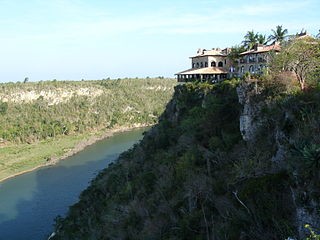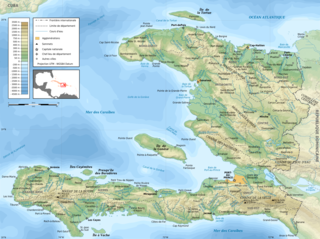
The recorded history of the Dominican Republic began in 1492 when the Genoa-born navigator Christopher Columbus, working for the Crown of Castile, happened upon a large island in the region of the western Atlantic Ocean that later came to be known as the Caribbean. It was inhabited by the Taíno, an Arawakan people, who called the eastern part of the island Quisqueya (Kiskeya), meaning "mother of all lands." Columbus promptly claimed the island for the Spanish Crown, naming it La Isla Española, later Latinized to Hispaniola. After 25 years of Spanish occupation, the Taíno population in the Spanish-dominated parts of the island drastically decreased through genocide. With fewer than 50,000 remaining, the survivors intermixed with Spaniards, Africans, and others, forming the present-day tripartite Dominican population. What would become the Dominican Republic was the Spanish Captaincy General of Santo Domingo until 1821, except for a time as a French colony from 1795 to 1809. It was then part of a unified Hispaniola with Haiti from 1822 until 1844. In 1844, Dominican independence was proclaimed and the republic, which was often known as Santo Domingo until the early 20th century, maintained its independence except for a short Spanish occupation from 1861 to 1865 and occupation by the United States from 1916 to 1924.
The Academy Award for Best Documentary Feature Film is an award for documentary films. In 1941, the first awards for feature-length documentaries were bestowed as Special Awards to Kukan and Target for Tonight. They have since been bestowed competitively each year, with the exception of 1946. Copies of every winning film are held by the Academy Film Archive.

Saint-Domingue was a French colony in the western portion of the Caribbean island of Hispaniola, in the area of modern-day Haiti, from 1659 to 1804. The name derives from the Spanish main city on the island, Santo Domingo, which came to refer specifically to the Spanish-held Captaincy General of Santo Domingo, now the Dominican Republic. The borders between the two were fluid and changed over time until they were finally solidified in the Dominican War of Independence in 1844.

Ramón Buenaventura Báez Méndez, was a Dominican conservative politician and military figure. He was president of the Dominican Republic for five nonconsecutive terms. His rule was characterized by corruption and governing for the benefit of his personal fortune.

La Romana is a province of the Dominican Republic. The capital is also named La Romana, and is the third-largest city in the country. La Romana was elevated to the category of province in 1944. File:Catalina Island, La Romana, Dominican Republic. A cruise liner in coast waters of Catalina Isl, approaching the rocky shore. .jpg La Romana is also home to Casa de Campo, one of the world's largest resorts and top golfing destinations, including the Teeth of the Dog golf course. Many international and local artists perform at "Altos de Chavón", an artistic community and university.
Afro-Dominicans are Dominicans of predominant or full Black African ancestry. They are a minority in the country representing 7.8% of the Dominican Republic's population according to a census bureau survey in 2022. About 4.0% of the people surveyed claim an Afro-Caribbean immigrant background, while only 0.2% acknowledged Haitian descent. Currently there are many black illegal immigrants from Haiti, who are not included within the Afro-Dominican demographics as they are not legal citizens of the nation.
Westgate Resorts is an American timeshare resort company founded by David A. Siegel in 1982.
The Sugar Babies is a 2007 feature-length documentary film about exploitation in the sugar plantations of the Dominican Republic. The film, narrated by Edwidge Danticat, explores how the descendants of African slaves, are trafficked from Haiti to live and work in inhumane conditions akin to modern day slavery."

Solange Pierre, known as Sonia Pierre, was a human rights advocate in the Dominican Republic who worked to end antihaitianismo, which is discrimination against individuals of Haitian origin either born in Haiti or in the Dominican Republic. For this work, she won the 2006 Robert F. Kennedy Human Rights Award.
Christopher Hartley is a British-Spanish Catholic missionary priest who worked from 1997 to 2006 to improve the working and living conditions of the Haitian sugar cane workers in San José de los Llanos in the province of San Pedro de Macorís, Dominican Republic. His work there was the subject of the documentary film The Price of Sugar (2007), produced and directed by Bill Haney.
The Dominican Republic has a 0.7 percent prevalence rate of HIV/AIDS, among the lowest percentage-wise in the Caribbean region. However, it has the second most cases in the Caribbean region in total, with an estimated 46,000 HIV/AIDS-positive Dominicans as of 2013.
The Vicini family is the wealthiest family in the Dominican Republic and is best known for their vast holdings in the sugar industry. The family business was started by Juan Bautista Vicini Canepa, who migrated to the Dominican Republic from Italy in 1860.

Obsidian Finance Group, LLC v. Cox is a 2011 case from the United States District Court for the District of Oregon concerning online defamation. Plaintiffs Obsidian Finance Group and its co-founder Kevin Padrick sued Crystal Cox for maintaining several blogs that accused Obsidian and Padrick of corrupt and fraudulent conduct. The court dismissed most of Cox's blog posts as opinion, but found one single post to be more factual in its assertions and therefore defamatory. For that post, the court awarded the plaintiffs $2.5 million in damages. This case is notable for the court's ruling that Cox, as an internet blogger, was not a journalist and was thus not protected by Oregon's media shield laws, although the court later clarified that its ruling did not categorically exclude blogs from being considered media and indicated that its decision was based in part upon Cox offering to remove negative posts for a $2,500 fee. In January 2014 the Ninth Circuit Court affirmed in part and reversed in part the district court's judgment awarding compensatory damages to the bankruptcy trustee. It also ordered a new trial on the blog post at issue.
José María Cabral González is a Dominican film director, screenwriter, and producer. He is considered one of the most important directors of the Dominican Republic. He has directed seven feature films. Cabral Gonzalez is recognized as the first Dominican filmmaker to be selected by the Sundance Film Festival with his movie ¨Woodpeckers¨.

Slavery in Haiti began after the arrival of Christopher Columbus on the island in 1492 with the European colonists that followed from Portugal, Spain and France. The practice was devastating to the native population. Following the indigenous Tainos' near decimation from forced labor, disease and war, the Spanish, under initial advisement of the Catholic priest Bartolomé de las Casas and with the blessing of the Catholic church, began engaging in earnest during the 17th century in the forced labor of enslaved Africans. During the French colonial period, beginning in 1625, the economy of Saint-Domingue, was based on slavery; conditions on Saint-Domingue became notoriously bad even compared to chattel slavery conditions elsewhere.
Uncommon Productions, LLC is an independent film company based in Boston, Massachusetts and Los Angeles, California. Founded in 2000 by Bill Haney and Tim Disney, Uncommon's films tend to focus on social issues. Recent films include cancer immunotherapy documentary, Jim Allison: Breakthrough, mountain top removal documentary The Last Mountain featuring Robert Kennedy Jr., and the NAACP Image Award nominated drama American Violet about drug enforcement, starring Alfre Woodard and Charles S. Dutton.
The Haitian minority of the Dominican Republic is the largest ethnic minority in the Dominican Republic since the early 20th century.

A Girl in the River: The Price of Forgiveness is a 2015 documentary film directed by Sharmeen Obaid-Chinoy about honor killings in Pakistan. The film is produced by Tina Brown and Sheila Nevins in collaboration with HBO Documentary Films. A Girl in the River was edited by Geof Bartz, A.C.E. The documentary earned widespread critical acclaim. A Girl in the River was shortlisted with ten other documentaries from 74 entries submitted to 88th Academy Awards in Documentary Short Subject category, which it won.

Room Full of Spoons is a 2016 Canadian documentary film directed by Rick Harper about the 2003 cult film The Room.
Samuel Martinez is a Cuban-born American ethnologist, ethnographer, cultural anthropologist, and professor at the University of Connecticut. He has published extensively on the struggle for human rights for Haitian immigrants in the Dominican Republic and their Dominican-born offspring. He has also done research on north–south knowledge exchange in human rights and on the rhetoric and visual culture of activism against modern slavery.









